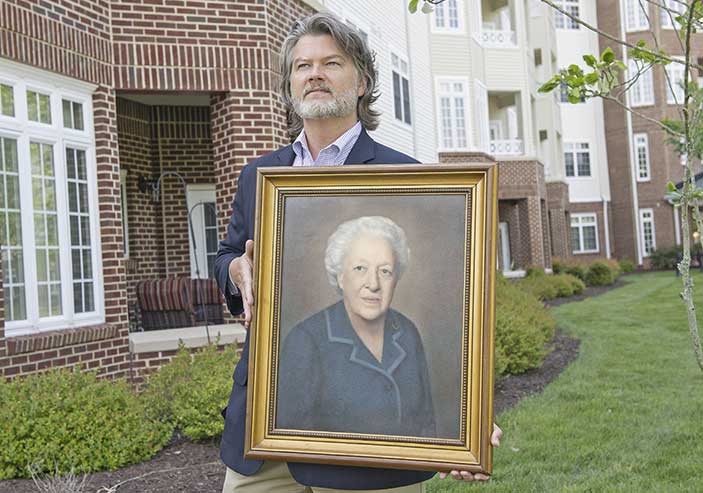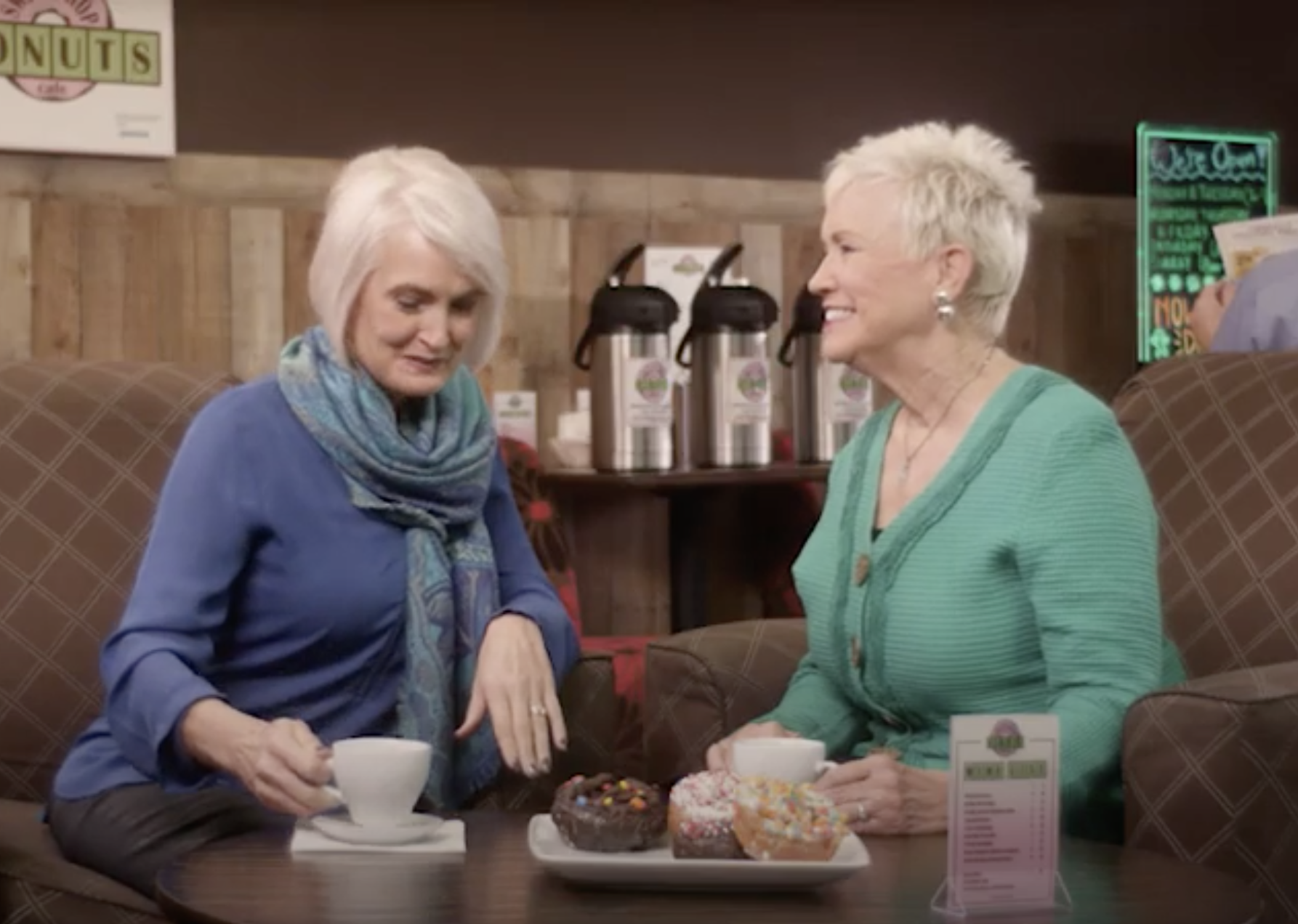
Those who knew Lucy Corr could be sure of one thing: She’d much rather talk about her dog, Mr. Pete, or fishing on the Eastern Shore, than discuss herself.
Corr – known to most as “Miss Lucy” – devoted her career to helping those who needed “a little extra lift in life.” The county’s first Christmas Mother, Corr served as the director of the Chesterfield Colonial Heights Department of Social Services from 1945 to 1978. She also proposed the creation of the Chesterfield County Nursing Home, a convalescent facility for indigent elderly who had been refused private care elsewhere. Corr ran the facility herself from its founding in 1970 until her retirement in 1978. Six years later, the facility was renamed in her honor.
Now entering its 50th year of operation, Lucy Corr stands today as a continuing care retirement facility, meaning that all aging care needs – from independent living to assisted living to skilled nursing care – can be addressed within the facility, which is off Route 10, near the county courthouse.
Recognizing the “critical” shortage of space in area convalescent homes for welfare clients, it was Corr who lobbied the county to establish a nonprofit nursing home. Today, her namesake continues her mission, offering a more affordable option than most for eldercare.
With her unbridled enthusiasm and booming laugh, Lucy Corr was the driving force behind many of the county’s early developments in social services.
Born in 1908, the King and Queen County native earned her bachelor’s degree from what is now Mary Washington University and her master’s in social work from an extension of the College of William and Mary during the Great Depression.
After completing her master’s in 1932, Corr went to work as a matron at the State Industrial Farm for Women, where she was provided room, board and unlimited working hours, but no salary. Over the next few years, she held various positions in Goochland, Augusta and Halifax counties before helping to organize the Culpeper County Welfare Department in 1936, becoming its superintendent. She held a similar post in Alleghany County from 1942 to 1945, then came here, becoming superintendent of the Chesterfield-Colonial Heights Department of Social Services.
“She loved doing things for people,” says Suzanne Fleming, who worked for Corr in the 1970s. “She loved it, and it was just part of her.”
In the era before Medicaid, Medicare and other social services, it was up to Corr to scrounge for funds and assistance to help those in need.
“She had to know everybody and put them in touch with people who could help,” says Derrick Kendall, Lucy Corr’s CEO since 2016. “She knew farmers. She knew Boy [Scout] scoutmasters. She knew church leaders, and she was managing benevolence from a very scattered network.”
Through her work, Corr saw the need for the county to establish a nursing home, as her department had to place people as far away as Amherst and Blackstone. Even today, the idea of a locality establishing a facility for eldercare is a rarity. Today, most eldercare options are either for-profit facilities run by companies, or faith-based retirement communities run by churches. And eldercare is costly; a 2019 article by Forbes put the annual cost of a medium private-room nursing home at $100,375.
“The idea was to put all of the elderly people who would outlive their resources and who didn’t have anybody supporting them in once place,” Kendall says.
In 1966, Corr went before the Chesterfield Board of Supervisors and proposed the construction of a nursing home to serve county residents. That effort received a major assist in 1969 when Austin Minnis Jr. donated the proceeds from a sale of 13.5 acres of his land in the Walthall area of Chester toward the creation of the retirement community.
The son of formerly enslaved people, Minnis worked as a laborer for most of his life and lived frugally in order to acquire a large tract of land, part of which was donated to establish the nursing home. A deacon at Bethesda Baptist Church in Colonial Heights, Minnis said the donation was “in return for the good things people have done for me.” Minnis would donate vegetables from his garden to the retirement community, and eventually become a resident of the facility he helped create. He died in 1981 at the age of 103.
On May 10, 1970, roughly 150 county residents attended the dedication of the $1.2 million Chesterfield County Nursing Home. Within seven months, Corr had filled all the facility’s 98 beds and a waiting list was established. Five years later, the nursing home saw a 94-bed expansion.
Corr retired from the facility in 1978 and passed in her Chester home in 1988 at the age of 79.
“She built the social services program,” recalls Lane Ramsey, former county administrator. “She built a lot of programs that were innovative for the time. When she saw the need for nursing home facilities, she worked hard, and it took a lot of convincing.”
As the son and grandson of Methodist ministers, Jake Mast would find a calling of his own in public service.
That service began as a medivac helicopter rescue pilot in Korea and Vietnam, earning him the Vietnamese Cross of Gallantry, Combat Medic Badge, Bronze Star, Distinguished Flying Cross and the Korean Prime Minister’s Citation for civilian disaster rescues.
“He was in some tight places and did some really exceptional things,” said retired Army Col. Jim Kalanges in a Richmond Times-Dispatch obituary for Mast, who died in 2015. “He’d go into hot zones, and he’d be taking fire … and he would fly in and pick up guys who were wounded and fly them back to a medical facility. He probably ended up saving a lot of lives.”
Back stateside, Mast, a man of quiet integrity, would dedicate his life to long-term geriatric care, including roughly three decades at Lucy Corr, first in the early 1970s, then as CEO from 1987 to 2015. Under Mast, Lucy Corr would undergo the major expansions that encompass its operation today.
“Jake was just the most down-to-earth, caring gentleman that I’ve had the opportunity to work with. He was passionate about Lucy Corr, and he cared so much about the entire place,” says Sarah Sneed, deputy county administrator for human services. “Jake took it to the next level and turned it into the continuing care community.”
In 1986, Lucy Corr created a 16-bed Alzheimer’s unit, the first of its kind in Virginia. After Mast’s return, it opened its on-site Adult Day Care Center in 1988, which gives a reprieve to working adults who are the primary caregivers for their parents.
By the late 1980s, the need to expand the services offered by Lucy Corr was evident. In order to achieve greater operational flexibility, Mast led an effort to transition the care facility from being county-run to becoming its own independent entity. The move allowed Lucy Corr more flexibility to compete with for-profit businesses, and lessened the county’s liability of owning and running a nursing home.
The county established the Lucy Corr Nursing Home Transition Committee in 1992 to consider alternatives to county ownership and operations of the facility. The Health Center Commission for the County of Chesterfield was established in January 1993. The HCC effectively took over control of Lucy Corr that July, and full operational control the following January.
That year, the state approved the construction of a new, 240-bed nursing home that would be developed as a teaching nursing home for health care professionals. In 1999, an updated Health Care Center at Lucy Corr opened its doors. The following year, Mast created the Lucy Corr Foundation to help cover the costs for people who couldn’t afford care on their own. If someone living at the facility outlives their resources and needs to go on Medicaid, Lucy Corr is one of the few continuing care retirement communities in the area that participates in the program. Generally speaking, Kendall says Lucy Corr is 15% less expensive than other senior care providers south of the river.
In 2009, Lucy Corr opened its independent living expansion, offering 52 independent living apartments and 25 cottages. With the establishment of independent living operations, Lucy Corr became a continuing care facility; essentially, once someone came through their doors, they wouldn’t have to go elsewhere for care.
This capability was something that Mast himself would take advantage of. After he received a terminal diagnosis, Mast and his wife sold their home in Brandermill and moved to Lucy Corr. On May 12, 2015, at the age of 75, Mast died from Agent Orange exposure sarcoma that he was exposed to while serving in the U.S. Army Medical Service Corps.
While the retirement community might bear the name of Lucy Corr, Kendall says its current operations are the result of Mast’s efforts.
“She’s credited for certainly starting it,” he says, “but Jake Mast deserves all the credit in the world for bringing it up into what we see today, and modernizing not just the buildings but the business model.”
Much has changed at Lucy Corr over the past half century, but its commitment to helping those in need stands firm.
“Miss Lucy Corr’s thought was to take care of those who can’t take care of themselves, and that’s still the main function at Lucy Corr,” says Kay Mast, who still lives at Lucy Corr and currently serves on its board. “Our occupancy of the Health Care Center itself is at least 75% Medicaid, which, of course, is lower funded than the actual cost of service.”
As for living there, Kay Mast has nothing but praise.
“It’s a small, neighborly community,” she says. “People from all walks of life, with wonderful stories to tell, and plenty of things to do.”
Like other senior living facilities right now, Lucy Corr has been on lockdown in response to the coronavirus pandemic, with residents largely isolated to their rooms and visits kept to a minimum. Though one part-time employee has tested positive for COVID-19, no residents have so far.
“The pressure and the fear, it flavors everything that we do, but it doesn’t cripple us,” says Kendall of the pandemic. “The residents have been pretty resilient. They’ve actually been encouraging to our staff. They’ve lived through the Great Depression and the Korean War and the Cuban Missile Crisis. They try to keep everything in perspective, especially with younger folks.”
Now, in addition to its internal services for the elderly, Lucy Corr offers free dental care for people over age 65 – for the facility’s residents and the general public – who don’t have dental insurance or are underinsured for the procedures they need and haven’t seen a dentist in the past year. Since 2012, Lucy Corr has provided more than $1.5 million in free dental care to people in the Chesterfield and Tri-Cities area.
In keeping with its history, Kendall says Lucy Corr is one of the most affordable senior care facilities in the area.
“That all corresponds with being able to solve the problem that Miss Lucy noticed back when the first building opened,” Kendall says. “There are a ton of people who have needs that their family and their resources can’t financially cover, and there needs to be a place for those people.”
Article written by: Rich Griset of the Chesterfield Observer
Photo Credit: Ash Daniel



